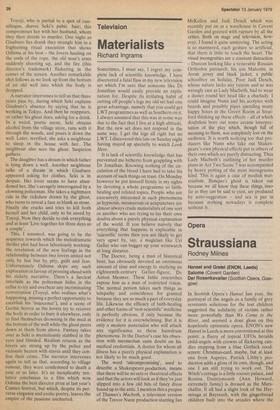Materialists
Richard Ingrams
Sometimes, I must say, I regret my complete lack of scientific knowledge. I have discovered a fatal flaw in my new television set which I'm sure that someone like Dr Jonathan would easily provide an explanation for. Despite its irritating habit of cutting off people's legs my old set had one great advantage, namely that you could get LWT programmes as well as Southern on it. I always assumed that this was in some way due to the fact that I live at a high altitude. But the new set does not respond in the same way. I get the legs all right but no LWT. I discovered this late on Sunday night having stayed up specially to watch Look Here.
It is lack of scientific knowledge that has prevented me hitherto from grappling with Dr Jonathan. Knowing nothing of the circulation of the blood I have had to take his account of such things on trust. On Monday however he put himself firmly in my sights by devoting a whole programme to faithhealing and related topics. People who are excessively interested in such phenomena as hypnosis, mesmerism or acupuncture are almost always crude materialists of one sort or another who are trying to lay their own doubts about a purely physical explanation of the world. If you believe naively that everything that happens is explicable in 'scientific' terms then you are likely to get very upset by, say, a magician like Uri Geller who can bugger up your wristwatch at long distance.
The Doctor, being a man of historical bent, has obviously devoted an enormous amount of time and energy to studying an eighteenth-century Geller-figure, Dr Anton Mesmer. These futile researches expose him as a man of restricted vision. The normal person takes such things as telepathy and coincidence for granted because they are so much a part of everyday life. Likewise the efficacy of faith-healing and other forms of 'non-scientific' medicine is perfectly obvious, if only because the evidence for it is overwhelming. But it is only a modern materialist who will attach any significance to these humdrum phenomena. In the Doctor's case his obsession with mesmerism casts doubt on his medical credentials. A doctor for whom all illness has a purely physical explanation is not likely to be much good.
The word 'uncompromising', used to describe a Shakespeare production, means that there will be no sets or theatrical effects and that the actors will look as if they've just slipped into a few old bits of fancy dress found up in the attic. I mention this a propos of Thames's Macbeth, a television version of the Trevor Nunn production starring Ian McKellen and Judi Dench which was recently put on at a warehouse in Covent Garden and greeted with rapture by all the critics. Both on stage and television, however, I found it quite unmoving. The acting is so mannered, each gesture so artificial, that there is little to touch the heart. The visual incongruities are a constant distraction — Duncan looking like a venerable Russian Orthodox patriarch, his son Malcolm, in Arran jersey and black jacket, a public schoolboy on holiday. Poor Judi Dench, whose nature lacks any venom and so was wrongly cast as Lady Macbeth, had to wear a duster round her head like a charlady. I could imagine Nunn and his acolytes with beards and possibly pipes spending many happy hours in the Green Room at Stratford thinking up these effects — all of which doubtless bore out some arcane interpretation of the play which, though full of meaning to them, was completely lost on the audience. It is worth noticing too that producers like Nunn who take out Shakespeare's own physical effects put in others of their own which are purely distracting. Thus Lady Macbeth's outlining of her murder plans in Act Two Scene 7 was accompanied by heavy petting of the most incongruous kind. This is again a case of modish materialism. Banquo's ghost is taken out because we all know that these things, insofar as they can be said to exist, are produced by auto-suggestion — and sex is put in because nothing nowadays is complete without it.


































 Previous page
Previous page